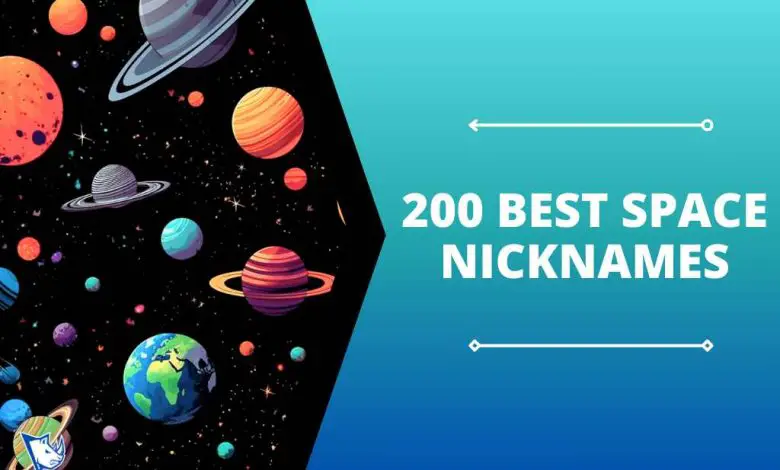200 Space Nicknames Unveiling The Celestial Codenames

Each star, galaxy, planet, and meteor holds a story, often encapsulated in a single, evocative nickname. These one-word monikers serve as a bridge between the unfathomable depths of space and our quest for understanding.
From the awe-inspiring to the whimsical, and the foreboding to the beloved, space nicknames reflect our scientific discoveries, fears, hopes, and sense of wonder.
The cosmos, an ever-expanding tapestry of mysteries, has captivated humanity’s imagination for millennia.
Read Also>> 65+ Japanese Names That Mean Star
Best Space Nicknames
- Orion – The hunter constellation, guiding civilizations for centuries.
- Milkyway – Our galaxy, named for its milky appearance across the night sky.
- Halley – The most famous comet, returning every 74-79 years.
- Pillars – The Pillars of Creation, iconic star-forming columns in the Eagle Nebula.
- Sirius – The brightest star in our night sky, known as the “Dog Star.”
- Polaris – The North Star, an age-old navigational beacon.
- Andromeda – The nearest spiral galaxy to the Milky Way, and a mythical princess.
- Supernova – The brilliant explosion of a dying star, creating cosmic fireworks.
- Titan – Saturn’s largest moon, named after the ancient Titans.
- Eclipse – The celestial event that occurs when one celestial body moves into the shadow of another.
- Cosmos – A term that encompasses the universe in all its magnificence.
- Nebula – Clouds of gas and dust where stars are born.
- Quasar – Bright, distant celestial objects powered by black holes.
- Solstice – The times of the year when the Sun’s path is farthest from the equator.
- Galaxy – Massive systems of stars, planets, and space dust bound together by gravity.
- Meteor – The streak of light we see when a meteoroid burns up in Earth’s atmosphere.
- Voyager – Named after the spacecraft that have ventured into the unknown.
- Zenith – The point in the sky directly above an observer on Earth.
- Lunar – Relating to the Moon, reflecting its influence and beauty.
- Aurora – The natural light displays in Earth’s sky, predominantly seen in the polar zones.
- Comet – Celestial objects composed of ice and dust, known for their spectacular tails.
- Crater – The bowl-shaped depressions found on celestial bodies.
- Dwarf – As in dwarf planets, celestial bodies that orbit the Sun but are not the dominant objects in their orbit.
- Equinox – The time of year when day and night are of equal length, marking the start of spring and autumn.
- Horizon – The line at which the Earth’s surface and the sky appear to meet.
Good Space Nicknames
- Terra – Latin for Earth, representing our home planet in the cosmos.
- Helios – The Greek god of the sun, symbolizing the central star of our solar system.
- Luna – The ancient Roman goddess of the Moon, symbolizing its beauty and mystery.
- Phoenix – A mythical bird, symbolizing rebirth, named for a constellation.
- Pegasus – A winged horse from mythology, representing a constellation.
- Gemini – The twins from mythology, symbolizing the duality of space exploration.
- Nova – A star showing a sudden increase in brightness, then slowly fading.
- Io – One of Jupiter’s moons, known for its volcanic activity.
- Pluto – Once considered the ninth planet, now a symbol of celestial reclassification.
- Saturn – Known for its magnificent rings, symbolizing the complexity and beauty of the solar system.
- Mercury – The closest planet to the Sun, named after the Roman messenger god.
- Venus – Earth’s sister planet, named after the Roman goddess of love and beauty.
- Mars – Known as the Red Planet, symbolizing exploration and the future of humanity.
- Jupiter – The largest planet in our solar system, symbolizing protection and strength.
- Neptune – The farthest known planet in our solar system, symbolizing mystery and the unknown.
- Uranus – Known for its unique rotation, symbolizing innovation and change.
- Electra – A star in the Pleiades, symbolizing brightness and clarity.
- Lyra – A constellation symbolizing the lyre of Orpheus, representing music and arts in the cosmos.
- Atlas – A moon of Saturn, and a Titan who held up the sky, symbolizing strength and endurance.
- Calypso – A moon of Saturn, named after a nymph in Greek mythology, symbolizing beauty and hidden knowledge.
- Dione – A moon of Saturn, named after a Titaness, symbolizing the divine.
- Elara – A moon of Jupiter, symbolizing the vastness and diversity of the solar system.
- Fenrir – A moon of Saturn, named after a monstrous wolf in Norse mythology, symbolizing the untamed nature of the cosmos.
- Ganymede – Jupiter’s largest moon, symbolizing youth and favor of the gods.
- Hyperion – A moon of Saturn, named after a Titan, symbolizing light and observation.
Funny Space Nicknames
- Snoopy – Nickname for the Apollo 10 lunar module, symbolizing playfulness and exploration.
- Nibbler – A fictional planet from “Futurama,” evoking humor in cosmic consumption.
- Bacon – A playful nickname for a star with a sizzling radio signal.
- Pickle – A whimsical moniker for a comet with a peculiar shape.
- Burrito – A fun name for a galaxy with a spiral, wrapped appearance.
- Wobble – Informal term for the movement of stars caused by orbiting planets.
- Ducky – A comet with a duck-shaped nucleus, showcasing the whimsy of the cosmos.
- Tater – A playful nickname for potato-shaped asteroids.
- Blinky – A variable star known for its noticeable changes in brightness.
- Boomerang – A nebula with a shape reminiscent of the returning tool, symbolizing the mysteries of formation and evolution.
- Noodle – A galaxy with a long, slender shape, bringing humor to cosmic structures.
- Doodle – A light-hearted name for a nebula with intricate, abstract patterns.
- Cheese – A nickname for the Moon, inspired by its cratered, mottled surface.
- Giggles – A star system with an unusual, oscillating signal.
- Kazoo – A whimsical name for a musical, pulsating star.
- Muffin – A fluffy, cloud-like nebula in a compact galaxy.
- Nugget – A small, golden-hued star cluster.
- Pancake – A galaxy with a super thin, flat appearance.
- Quackers – A duck-shaped asteroid, adding humor to celestial discoveries.
- Rhubarb – A nebula with a reddish-pink hue, reminiscent of the plant.
- Spudnik – A playful take on Sputnik, for potato-shaped moons or asteroids.
- Taco – A galaxy with a shape that humorously resembles a taco.
- Wiggles – A star with an erratic, wobbling motion.
- Yoyo – A binary star system with a cyclic pattern of distance variation.
- Zigzag – A lightning-shaped galaxy, adding fun to cosmic configurations.
Evil Space Nicknames
- Voldemort – An unofficial name for a planet with a particularly hostile environment.
- Mordor – A region on one of Saturn’s moons, symbolizing darkness and danger.
- Hades – A planet or region known for extreme temperatures, after the Greek underworld.
- Gorgon – A venomous star system, after the mythical creatures with hair of snakes.
- Dracula – A dark, absorbing nebula or black hole, symbolizing mystery and allure.
- Sauron – A solitary, mysterious exoplanet, named after the “Lord of the Rings” antagonist.
- Hydra – A chaotic asteroid field, named after the multi-headed serpent.
- Doomstar – A star with fatal potential, perhaps one nearing supernova.
- Phantom – A barely detectable dark nebula, evoking a sense of the unknown.
- Wraith – A vanishing comet or asteroid, symbolizing fleeting yet impactful presence.
- Necro – A dead or dying star system, evoking death and the end.
- Ghoul – A pulsar with an eerie pulsing signal, symbolizing the uncanny.
- Banshee – A whistling space wind, named for the wailing spirit.
- Lich – A planet orbiting a pulsar, symbolizing death and rebirth.
- Maleficent – A dangerously beautiful nebula, named for the Disney villain.
- Raven – A dark, mysterious exoplanet, after the ominous bird.
- Serpent – A twisting, dangerous asteroid belt.
- Viper – A swiftly moving comet with a potentially deadly trajectory.
- Widow – A black widow pulsar, known for consuming its companion.
- Xenomorph – A bizarrely shaped asteroid, named after the alien creature.
Cool Space Nicknames
- Nova – A star known for a sudden increase in brightness, then slowly fading.
- Lynx – A constellation, named for the animal known for its keen sight.
- Orbit – The path of a celestial body or artificial satellite around another body.
- Pulsar – A highly magnetized, rotating neutron star that emits beams of electromagnetic radiation.
- Quasar – Extremely bright, distant galaxies with active supermassive black holes at their centers.
- Rover – Vehicles exploring other planets, symbolizing curiosity and adventure.
- Sonic – A term for objects moving at or above the speed of sound, applied to fast-moving celestial objects.
- Titan – Saturn’s largest moon, invoking the strength and power of the mythological Titans.
- Umbra – The darkest part of a shadow, especially during an eclipse, symbolizing depth and mystery.
- Vortex – A spinning, often turbulent flow of fluid, including gas clouds and galaxies in space.
- Warp – A theoretical concept of bending space-time for faster-than-light travel.
- Xeno – Indicating something alien or foreign, perfect for unknown celestial objects.
- Yield – A term used in astrophysics to describe the production of elements in star processes.
- Zodiac – The belt of the heavens within about 8° on either side of the ecliptic, including all apparent positions of the sun, moon, and most familiar planets, symbolizing the ancient connection between celestial movements and human affairs.
- Nebula – Clouds of gas and dust in space, some of which are the birthplaces of stars, symbolizing creation and beauty.
- Galaxy – Massive, gravitationally bound systems of stars, planetary systems, and dark matter, symbolizing the vastness and diversity of the universe.
- Comet – Icy bodies that release gas or dust, forming a glowing coma and sometimes a tail, symbolizing change and permanence.
- Meteor – The visible streak of light from a meteoroid or asteroid as it enters the Earth’s atmosphere, symbolizing fleeting beauty and wishes.
- Eclipse – The celestial event that occurs when one celestial body moves into the shadow of another, symbolizing alignment and transformation.
- Horizon – The line at which the Earth’s surface and the sky appear to meet, symbolizing the boundary between known and unknown.
Cute Space Nicknames
- Bunny – A small, fluffy nebula or galaxy, evoking warmth and cuddliness.
- Cuddles – A cozy, warm star cluster.
- Dewdrop – A small, bright nebula, reminiscent of morning dew.
- Elf – A playful, luminous aurora.
- Fluffy – A particularly dense yet soft-looking cloud in a nebula.
- Giggles – A star system with an unusual, oscillating signal.
- Honey – A warm, golden-hued star or galaxy.
- Jellybean – Colorful, compact galaxies with a sweet appearance.
- Kitten – A small, playful comet or asteroid.
- Lollipop – A star with a distinctive, candy-like spectral signature.
- Muffin – A dense, compact star cluster with a sweet appearance.
- Nuzzle – A pair of galaxies appearing to touch or nuzzle each other.
- Pebble – A small, smooth moon of a larger planet.
- Quokka – A small, happy-looking asteroid or comet, named after the cheerful animal.
- Ripple – Gentle wave patterns in cosmic dust clouds.
- Sprinkle – A light, dusting of stars within a galaxy.
- Tulip – A nebula with a shape resembling the flower, symbolizing growth and beauty.
- Wink – A variable star that seems to twinkle or wink.
- Pixie – A playful, magical aurora.
- Butterfly – A nebula with wing-like gas and dust formations.
- Daisy – A star cluster with a pattern resembling the flower.
- Echo – The repeating pattern of light from a pulsating star.
- Fawn – A young, forming star with gentle qualities.
- Glimmer – A faint, distant galaxy with a hopeful shine.
- Halo – The circular light pattern around stars or galaxies.
Famous Space Nicknames
- Hubble – Named after the Hubble Space Telescope, symbolizing discovery and exploration.
- Apollo – The NASA program that landed the first humans on the Moon, symbolizing achievement and adventure.
- Curiosity – The Mars rover, representing exploration and the quest for knowledge.
- Sputnik – The first artificial Earth satellite, symbolizing the dawn of the space age.
- Challenger – A space shuttle known for both its achievements and tragic accident, symbolizing bravery and loss.
- Voyager – Spacecraft on a grand tour of the solar system and beyond, symbolizing human curiosity and ambition.
- Cassini – A mission that explored Saturn, symbolizing detailed study and discovery.
- Galileo – Named after the astronomer, symbolizing the quest for understanding the universe.
- Kepler – A space observatory known for discovering exoplanets, symbolizing the search for other worlds.
- Rosetta – A mission that landed on a comet, symbolizing determination and technological achievement.
- Opportunity – A Mars rover known for exceeding its expected lifespan, symbolizing perseverance and discovery.
- Juno – A spacecraft exploring Jupiter, symbolizing protection and care.
- New Horizons – A mission that flew by Pluto, symbolizing new beginnings and distant exploration.
- Pioneer – Early spacecraft that ventured beyond the asteroid belt, symbolizing trailblazing exploration.
- Spirit – A Mars rover known for its pioneering exploration, symbolizing the spirit of discovery.
- Pathfinder – A mission that landed a sojourner rover on Mars, symbolizing innovation and exploration.
- Discovery – A space shuttle known for numerous missions, symbolizing the ongoing quest for knowledge.
- Endeavour – A space shuttle that represents the continuing effort and ambition in space exploration.
- Falcon – Named after the Falcon rockets, symbolizing speed, strength, and the pursuit of knowledge.
- Enterprise – Named for the Space Shuttle and the fictional starship, symbolizing exploration and adventure.
Conclusion
The universe speaks to us in a language beyond words, through the light of distant stars, the dance of galaxies, and the silent whispers of celestial bodies. The nicknames we bestow upon these cosmic entities serve not only as markers on a map of the infinite but as symbols of our deepest fears, greatest hopes, and unquenchable curiosity.



